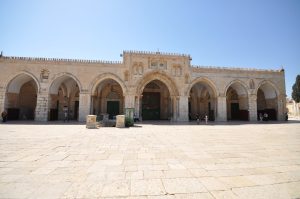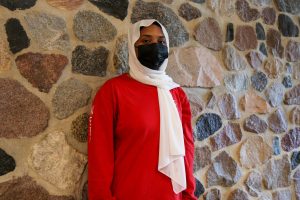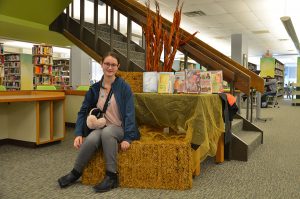Guest column: Jinann’s Visit to Palestine
Guest columnist Jinann Abudagga ’25 shares their experience witnessing the distressing events which resulted from the Israel-Palestine conflict.
Feelings of despair and confusion fill those in Sudan as the already struggling country turns into a battlefield.
May 11, 2023
Due to the apartheid state of Israel, people living in Palestine exchange their freedom for safety. When I went to Palestine this winter break, I witnessed Israelis and their allies’ unjust treatment of the Palestinian people. Although I went to Gaza, an area in Palestine where Israelis are not allowed to enter, I still witnessed many indirect effects of Israel on Palestine.
First of all, Israel blew up Gaza’s airport, and Gaza is not allowed to rebuild it; you have to fly into either Egypt or Jordan. If you fly into Jordan, you cannot leave Gaza for a year and must exit through Jordan, so my family flew through Cairo. When you arrive in Cairo, you must find a special driver to get you from Cairo to Gaza. The driver will then take you to the Suez Canal. People going to Palestine are not allowed to go through the bridges across the Suez. So, to get to the Sininad peninsula, people must take a fairy. At the fairy, a long line of cars is waiting to get onto the fairy. My family arrived there around midnight on a Sunday. Only one fairy leaves daily, and each takes about 30 cars. Many families wait days to get across the Suez. My family was lucky enough to get on a fairy Monday morning.
Before getting on the fairy, Israeli troops search your bags, and they give you zero mercy. They open anything in a box, take laptops away if they aren’t charged, and unfold and dump everything. After the fairy ride, you begin the trip into Palestine; the goal is to make it through the Arish checkpoint before 4. If you don’t make it through that checkpoint, they make you spend the night in the town of Arish and start again tomorrow. On the drive to Gaza, there is a checkpoint every 10-20 minutes. At the checkpoints, they check your passports and open up bags. Sometimes at checkpoints, they pull you aside and tell you to wait for no reason. On my way there, I remember being stopped by a couple of other cars at a checkpoint for two hours. At checkpoints, you are not allowed to have your phone out. And if they catch you with your phone, the troops take it away. My dad got his phone taken away for simply checking the time.
After that, the 3-hour drive from the Suez took nine hours. The waiting and the abuse did not stop when we got to the border. On the Egyptian side of the border crossing, we waited in a line for three hours to get into an empty building while the troops just sat there. When we got into the building, we went through security again; then, we waited in another 5-hour line to get our bags opened up. After they checked our bags, we went to customs. They take your passport for maybe hours without reason. Once you get your passport back, you get on a bus to the Palestinian side of the border crossing, which is nice and easy and may take 20 mins.
When I was in Gaza, I was there at a time of peace, but I would talk to the people there, and they would tell me that their houses would get bombed during the wars. They also said they couldn’t go to school during times of violence. My grandpa took me to the border, where we saw the electric fence into Israel with troops and tanks lined up behind it. I was told that I could not get any closer than a mile to it by a Palestinian soldier or I would get shot. He told me a story of an 8-year-old boy who threw a rock toward the border and was killed.
My grandpa also took me to a refugee camp inside Gaza. The people that once lived in the area of now Israel were kicked out of their homes and brought to Gaza, but since they have been displaced for so long, the refugee camps are no longer tents and have become houses. But since the camps are so overcrowded, the houses are so close together that you can barely walk between them. When I went to the ocean, I would see a bunch of rubble from the buildings bombed in the times of war just dumped into the water.
In Gaza, I also had the opportunity to go to school for a day. The building was at least 100 years old, and the textbooks were extremely outdated. The Palestinian government can not even support people to have a decent education. On top of that, those in Gaza only get four hours of electricity a day; children in school learn with zero power most days. It’s not like it matters; the classrooms are so old that the only type of electricity needed in classrooms is lightbulbs.
Despite all these challenges, Gazans still live their life and thrive as individuals. Although I was only there for three weeks, I was personally affected by this ongoing conflict. People in the Gaza Strip are suffering every day to keep their lives intact. The trauma each and every one faces affects their lives frequently, but life goes on, and so do they. This trip has taught me how to persevere through challenges and the injustice that needs to change in the Gaza Strip.









